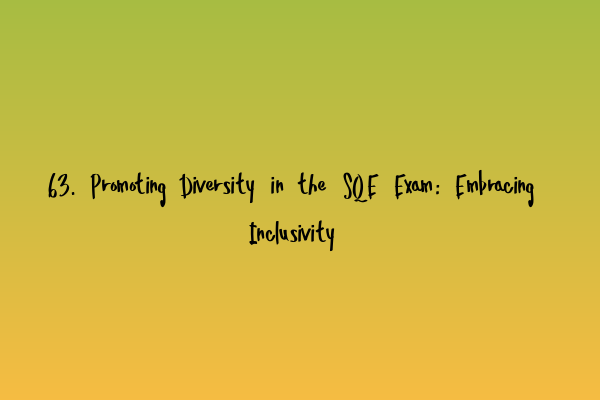Promoting Diversity in the SQE Exam: Embracing Inclusivity
Welcome to SQE Exam Law! In today’s blog post, we will delve into the importance of promoting diversity and embracing inclusivity within the SQE exam. As the legal profession continues to evolve, it is crucial that the examination process reflects the diverse society we live in. By fostering inclusivity, we can create a more level playing field for aspiring solicitors from all backgrounds to demonstrate their knowledge, skills, and capabilities.
The Power of Diversity
Diversity within the legal profession not only enriches the sector but also ensures that justice is served in a fair and unbiased manner. Legal matters touch the lives of individuals from all walks of life. Therefore, it is essential that the solicitors representing them come from a wide range of backgrounds, cultures, and experiences.
The SQE exam, as the gateway to the legal profession in England and Wales, plays a crucial role in ensuring that diversity is embraced. By considering and accommodating the needs of diverse individuals, the exam can assess candidates’ abilities more accurately. This way, it becomes a true indicator of their potential as future solicitors.
At SQE Exam Law, we believe that diversity brings different perspectives and ideas to the table, fostering innovation and creativity. By promoting diversity in the SQE exam, we contribute to a legal profession that is better equipped to serve the needs of a diverse society.
Creating an Inclusive SQE Exam
An inclusive SQE exam takes into account the needs of candidates from various backgrounds. It ensures that all individuals, regardless of their gender, race, ethnicity, age, disability, or socio-economic status, have equal opportunities to succeed.
One way to achieve inclusivity is by providing study materials and resources in multiple formats. This caters to different learning styles and accessibility needs. As mentioned in our previous article, “24. Unlocking Knowledge with SQE Webinars: Expert Insights at Your Fingertips,” webinars are an excellent example of such resources. They offer a convenient platform for candidates to access expert insights and engage in interactive learning.
Furthermore, the SQE exam should also consider the diverse cultural and linguistic backgrounds of candidates. Providing language support and translation services can help level the playing field, ensuring that language barriers do not hinder candidates’ performance. This is especially important for candidates whose first language may not be English.
Promoting Equal Opportunities
Equal opportunities are at the heart of an inclusive SQE exam. It is crucial to create a fair and transparent assessment process that gives every candidate an equal chance to demonstrate their legal knowledge and skills.
Our article “17. Review of SQE Course Providers: Choosing the Best Fit” discusses the importance of choosing the right course provider. When selecting a course provider, ensure that they have a track record of promoting diversity and inclusivity in their teaching methods. Look for providers that offer a variety of study materials and support schemes tailored to meet the needs of diverse candidates.
To ensure the integrity of the SQE exam, it is essential to have a diverse panel of examiners. A diverse group of examiners brings different perspectives and experiences, ultimately enriching the evaluation process. Our article “4. Unveiling the SRA Syllabus for the SQE” provides insights into the examination structure and syllabus, illustrating how it can be designed to accommodate diverse candidates while maintaining its rigor and quality.
Evaluating Diversity: The Grading System in SQE
The grading system within the SQE exam is another aspect that deserves careful consideration when promoting diversity and inclusivity. Our article “Grading System in SQE: Understanding How Exams are Evaluated” provides valuable insights into how the grading system works.
An inclusive grading system ensures that candidates from diverse backgrounds are not unfairly disadvantaged due to biases or systemic barriers. It should be designed to give weight to candidates’ knowledge, skills, and practical abilities, taking into account the different paths they may have taken to reach the SQE exam.
Conclusion
Promoting diversity and embracing inclusivity in the SQE exam are imperative to shape a legal profession that truly represents our diverse society. By striving for inclusivity, we create an environment where aspiring solicitors from all backgrounds can showcase their abilities and contribute to the legal profession.
For more tips and insights on preparing for the SQE exam, check out our article “31. Conquer the SQE: Insider Tips and Study Tricks for Success.” Together, let’s build a more diverse and inclusive legal profession.
